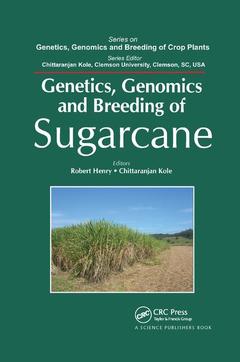Genetics, Genomics and Breeding of Sugarcane
Coordonnateurs : Henry Robert J., Kole Chittaranjan

The fast-growing sugarcane plant is a major source of sugar (sucrose) in tropical and sub-tropical regions. The high productivity of the plant also makes it a key target for use as an energy crop. The fiber of the plant is used to generate electricity and produce ethanol as a fuel.
Sugarcane is a hybrid of two species, each of which is genetically complex. The high level of genetic complexity in sugarcane creates challenges in the application of both conventional and molecular breeding to the genetic improvement of sugarcane as a sugar and energy crop.
This book describes technologies that support the continued use and improvement of sugarcane as source of food and energy. Recent technology developments indicate the potential to greatly increase our understanding of the sugarcane plant by application of emerging genomic technologies. This should result in an increased rate of improvement of sugarcane for human uses.
Basic Information on the Sugarcane Plant. Molecular Cytogenetics. Diversity Analysis. Association Studies. Molecular Genetic Linkage Mapping in Saccharum: Strategies, Resources and Achievements. Mapping, Tagging, and Map-Based Cloning of Simply Inherited Traits. Molecular Mapping of Complex Traits. Structural Genomics and Genome Sequencing. Functional Genomics: Transcriptomics of Sugarcane—Current Status and Future Prospects. Proteomics and Metabolomics. Role of Bioinformatics as a Tool for Sugarcane Research. Future Prospects.
Robert Henry, Centre for Plant Conservation Genetics, Southern Cross University, Lismore, NSW, Australia
Chittaranjan Kole, Department of Genetics and Biochemistry, Clemson University, South Carolina, USA
Date de parution : 09-2019
15.2x22.9 cm
Disponible chez l'éditeur (délai d'approvisionnement : 14 jours).
Prix indicatif 74,82 €
Ajouter au panierThèmes de Genetics, Genomics and Breeding of Sugarcane :
Mots-clés :
Ta Te; Genus Saccharum; Basic Information on the Sugarcane Plant; Sugarcane Genome; Molecular Cytogenetics; AFLP Marker; Molecular Genetic Linkage Mapping in Saccharum: Strategies; Resources and Achievements; SSR Marker; Molecular Mapping of Complex Traits; Modern Sugarcane Cultivars; Role of Bioinformatics as a Tool for Sugarcane Research; RAPD Marker; Basic Chromosome Number; Puccinia Melanocephala; Sucrose Phosphate Synthase; Sucrose Accumulation; Sugarcane Cultivars; BAC Clone; RFLP Marker; BAC Library; Genetic Linkage Maps; Saccharum Species; Single Marker Analysis; Biparental Crosses; QTL Mapping; SD Marker; Repulsion Phase Linkages; SSR Primer; Sugarcane Breeding; Repetitive DNA



